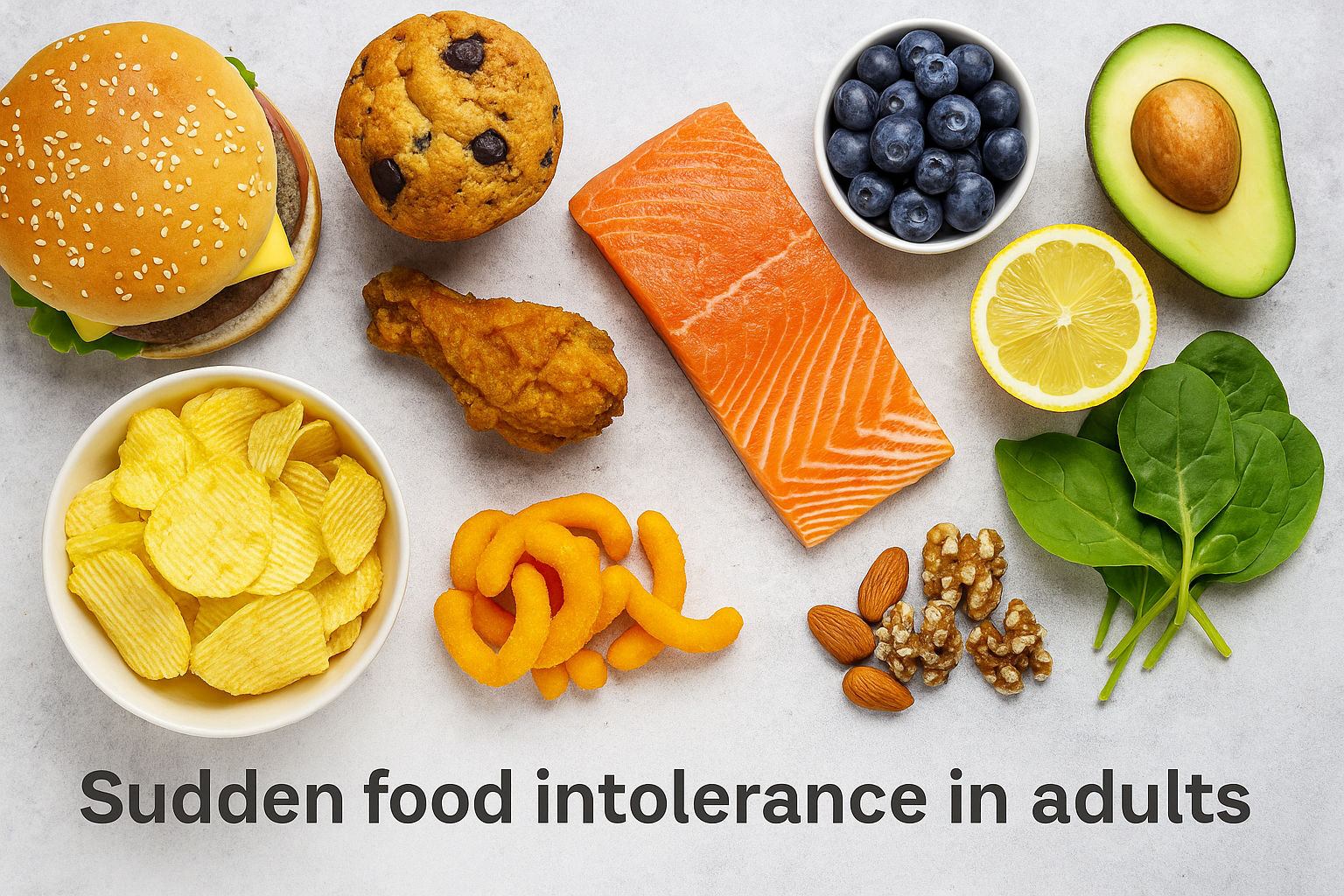It’s frustrating and confusing. Many of our clients come to us asking:
“Why do I suddenly have a food intolerance as an adult?”
The truth is that adult onset food intolerances are more common than most people realize. But just because they’re common doesn’t mean they’re random — there are always reasons your body starts reacting to foods it once tolerated.
Causes of Sudden Food Intolerances
When we dig deeper with clients, we often uncover a combination of factors that triggered the sudden intolerance:
- Gut Dysbiosis: An imbalance of good and bad bacteria can make it harder for your body to process certain foods.
- Stress & Immune Burden: High stress levels, illness, or a major life event can trigger changes in digestion and immune tolerance.
- Enzyme Deficiency: Over time, your body may produce fewer enzymes (like lactase), making it harder to break down certain food groups.
- Toxin Load: Pesticides, chemicals, and processed foods contribute to overall inflammation, tipping the body toward reactivity.
- Hormonal Shifts: Pregnancy, postpartum changes, perimenopause, or other hormonal transitions can influence gut health and immune function.
Understanding the causes of sudden food intolerances helps you stop guessing and start taking action.
The Link Between Gut Health and Food Intolerances
Your gut isn’t just for digestion — it houses nearly 80% of your immune system. When your gut barrier becomes compromised (sometimes called “leaky gut”), foods that should be harmless can trigger immune responses, leading to inflammation from food intolerances.
This inflammation doesn’t just stay in your gut. It can affect your skin, joints, energy levels, and even mood.
At Haven Holistic Health, we see this pattern often:
- New skin rashes or eczema flare-ups
- Joint pain or muscle aches after meals
- Persistent bloating or gas
- Brain fog or fatigue after eating
When symptoms appear suddenly, it’s your body’s way of asking for a reset — not a lifetime of symptom suppression.
Why This Happens in Adults
Many people assume that food intolerances are something you’re “born with,” but they can develop at any age. Adult onset food intolerances often happen after:
- A course of antibiotics
- Major stress or illness
- Dietary changes (like going vegan, keto, or paleo)
- Travel that introduced new bacteria into the gut
This is why it’s so important to look at your health history and recent life events when trying to uncover the root cause.
Dr. Kolby has been transformational in my digestive health. He spent quality time with me to understand my issues and guided me through a long journey of recovery.
I suffered chronic diarrhea for decades. Because I maintained normal body weight through overeating, doctors or other health providers in the past didn’t really care about my issues.
After working with Dr. Kolby for about six months, I was able to cut out my intolerances. Now I can clearly tell how certain food irritates my guts and how long it takes to recover from accidentally eating them. Once my gut health has greatly improved, I noticed more wonderful changes in my overall health.
I no longer suffer drowsiness and foggy brain during the day. My decades long cold feet problems almost disappeared, too. I will continue doing the great things that Dr. Kolby taught. I hope my health continuously improves. Thank you to Haven!
— Isabel K.
This is why we love what we do at Haven — helping people connect the dots, not just cover up the symptoms.
How to Test for Food Intolerances
If you suspect you have developed a new food intolerance, the first step is to test — not guess.
While at-home kits can be a starting point, many only measure IgG antibodies, which can be misleading. Just because your body recognizes a food doesn’t mean it’s harmful.
At Haven, our food intolerance evaluation for adults includes:
- Comprehensive Testing
We use a method that helps identify foods your body struggles to process — the ones driving inflammation. - Professional Review
One of our practitioners reviews your results with you, connecting them to your symptoms and history. - Personalized Plan
We provide a clear, step-by-step approach to rebalancing your gut, calming your immune system, and supporting skin healing.
At Haven Holistic Health, we go beyond surface-level solutions by offering a Food Intolerance Evaluation that identifies what foods may be triggering your symptoms.
Unlike many at-home food sensitivity tests that measure IgG antibodies (which can simply reflect exposure, not intolerance), our approach combines results with a professional review so you can truly understand what’s happening in your body.
Stop Guessing, Start Listening
If you’ve been struggling with skin rashes after eating, dealing with acne linked to gut health, ask yourself why you bloat after eating, or feeling stuck in a cycle of flare-ups and creams, it’s time to dig deeper. Whether you’re bloated after certain foods or extremely bloated after every meal, your body is trying to tell you something. It’s time to dig deeper.
👉 Don’t settle for quick fixes. Get real answers with Haven’s Food Intolerance Evaluation. Order your kit now and take the first step toward clarity and comfort.
FAQ: Common Questions About Food Intolerances and Skin
Q: Can food intolerances really cause acne?
Yes. Research shows a strong connection between the gut and the skin. Inflammation caused by food intolerances can trigger acne flare-ups, especially around the jawline and cheeks.
Q: How long until I see results after changing my diet?
Most people notice improvements in 4–6 weeks after removing trigger foods, though full skin healing can take a few months.
Q: Is eczema always linked to food intolerances?
Not always, but food intolerances can make eczema worse. Identifying and removing them can significantly reduce flare-ups.
Your skin doesn’t just need another cream — it needs clarity.
By uncovering your unique food triggers, you can calm inflammation, rebalance your gut, and restore healthy, vibrant skin from the inside out.
Order your Food Intolerance Kit today and start listening to your body in a way that leads to healing.
Don’t keep guessing. Order Your Food Intolerance Kit today and start listening to your body in a way that leads to healing.


Leave a Reply
You must be logged in to post a comment.